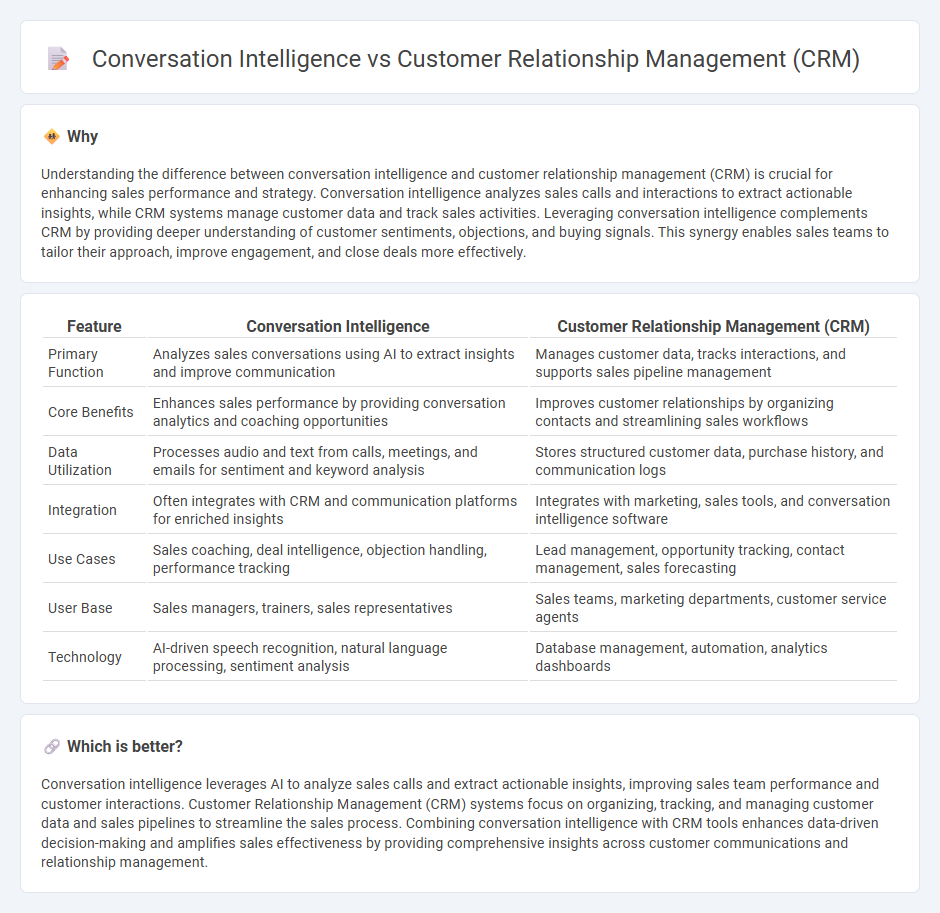
Conversation intelligence leverages artificial intelligence to analyze sales calls and meetings, extracting valuable insights such as customer sentiment, key topics, and buying signals to enhance sales strategies. Customer Relationship Management (CRM) systems centralize customer data, track interactions, and manage sales pipelines for improved customer engagement and streamlined workflows. Discover how integrating conversation intelligence with CRM can transform your sales approach and boost performance.
Why it is important
Understanding the difference between conversation intelligence and customer relationship management (CRM) is crucial for enhancing sales performance and strategy. Conversation intelligence analyzes sales calls and interactions to extract actionable insights, while CRM systems manage customer data and track sales activities. Leveraging conversation intelligence complements CRM by providing deeper understanding of customer sentiments, objections, and buying signals. This synergy enables sales teams to tailor their approach, improve engagement, and close deals more effectively.
Comparison Table
| Feature | Conversation Intelligence | Customer Relationship Management (CRM) |
|---|---|---|
| Primary Function | Analyzes sales conversations using AI to extract insights and improve communication | Manages customer data, tracks interactions, and supports sales pipeline management |
| Core Benefits | Enhances sales performance by providing conversation analytics and coaching opportunities | Improves customer relationships by organizing contacts and streamlining sales workflows |
| Data Utilization | Processes audio and text from calls, meetings, and emails for sentiment and keyword analysis | Stores structured customer data, purchase history, and communication logs |
| Integration | Often integrates with CRM and communication platforms for enriched insights | Integrates with marketing, sales tools, and conversation intelligence software |
| Use Cases | Sales coaching, deal intelligence, objection handling, performance tracking | Lead management, opportunity tracking, contact management, sales forecasting |
| User Base | Sales managers, trainers, sales representatives | Sales teams, marketing departments, customer service agents |
| Technology | AI-driven speech recognition, natural language processing, sentiment analysis | Database management, automation, analytics dashboards |
Which is better?
Conversation intelligence leverages AI to analyze sales calls and extract actionable insights, improving sales team performance and customer interactions. Customer Relationship Management (CRM) systems focus on organizing, tracking, and managing customer data and sales pipelines to streamline the sales process. Combining conversation intelligence with CRM tools enhances data-driven decision-making and amplifies sales effectiveness by providing comprehensive insights across customer communications and relationship management.
Connection
Conversation intelligence integrates with customer relationship management (CRM) systems to analyze sales calls and extract actionable insights, enhancing lead qualification and customer profiling. This synergy enables sales teams to identify patterns in customer interactions, optimize follow-up strategies, and increase conversion rates. Leveraging AI-driven conversation analytics within CRM streamlines pipeline management and improves overall sales performance.
Key Terms
**Customer Relationship Management (CRM):**
Customer Relationship Management (CRM) systems centralize customer data to streamline sales, marketing, and support processes, enhancing customer retention and driving revenue growth. These platforms provide comprehensive tools for tracking interactions, managing leads, and automating workflows that personalize customer experiences. Explore how CRM solutions can transform your customer engagement strategy and boost business performance.
Contact Management
Customer Relationship Management (CRM) systems centralize contact management by storing detailed client data, tracking interactions, and facilitating organized communication across sales and support teams. Conversation intelligence enriches contact management by analyzing call recordings and transcripts to extract actionable insights such as customer sentiment, key topics, and follow-up reminders. Explore how integrating CRM with conversation intelligence boosts personalized engagement and optimizes customer relationships.
Sales Pipeline
Customer relationship management (CRM) systems specialize in organizing and tracking sales pipelines by managing contacts, deals, and forecasting revenue. Conversation intelligence enhances pipeline accuracy by analyzing sales calls and meetings to extract insights on buyer intent, objections, and next steps, enabling reps to prioritize opportunities effectively. Explore how integrating CRM with conversation intelligence can accelerate your sales pipeline performance and close deals faster.
Source and External Links
What is CRM (Customer Relationship Management)? - TechTarget - CRM is a combination of practices, strategies, and technologies companies use to manage and analyze customer interactions and data throughout the customer lifecycle to improve customer service, retention, and drive sales growth, involving operational, analytical, and collaborative CRM types.
What Is CRM? | IBM - CRM is a set of integrated technologies for documenting, tracking, and managing an organization's relationships and interactions with customers, supporting sales processes, lead management, and improving customer experiences through data-driven workflows.
What is CRM (customer relationship management)? Full guide - CRM helps sales teams track and drive revenue by capturing and managing customer interactions and sales activities across channels in a centralized system, providing pipeline visibility, forecasting, contact management, and workflow automation to enhance productivity and customer relationships.
 dowidth.com
dowidth.com